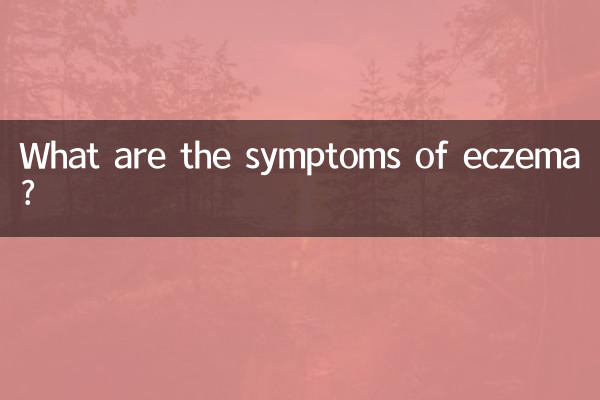What are the symptoms of eczema?
Eczema is a common inflammatory skin disease, mainly characterized by symptoms such as skin redness, itching, dryness, and scaling. In recent years, the incidence of eczema has increased year by year, becoming a health topic of concern to many people. This article will combine the popular discussions on the Internet in the past 10 days to provide you with a detailed analysis of the symptoms, types and coping methods of eczema.
1. Common symptoms of eczema

The symptoms of eczema vary depending on the type and severity, but these are the most common signs:
| symptom | describe |
|---|---|
| Itchy skin | The most typical symptom of eczema is itching, which varies from person to person and may affect sleep in severe cases. |
| redness of skin | The skin in the affected area appears red or dark red and may be swollen. |
| Dry and flaky | The surface of the skin is dry and rough, and white or yellow scales may appear. |
| blisters or oozing | Some patients will develop small blisters, which may ooze fluid and form scabs after ulceration. |
| thickened skin | Long-term recurring eczema may cause the skin to thicken and harden (lichenification). |
2. Types and characteristics of eczema
There are many types of eczema, each with slightly different symptoms and predilection areas:
| type | Main symptoms | Predisposed areas |
|---|---|---|
| acute eczema | Redness, swelling, blisters, exudate are obvious, and itching is severe | Face, hands, limbs |
| subacute eczema | Redness and swelling are reduced, exudation is reduced, and desquamation is the main problem | Limb flexion, trunk |
| chronic eczema | Skin thickening, pigmentation, and recurrent itching | Hands, feet, joints |
| atopic dermatitis | More common in infants and young children, accompanied by allergic rhinitis or asthma | Face, cubital fossa, popliteal fossa |
3. Hot topics of discussion on the entire network in the past 10 days
According to the recent hot discussions on the Internet, the following are high-frequency topics related to eczema:
| topic | focus |
|---|---|
| The relationship between eczema and diet | Are milk, eggs, seafood, etc. triggers? |
| The Hormone Ointment Controversy | Will long-term use cause dependence? |
| Chinese medicine treats eczema | Effectiveness of herbal topical application, acupuncture and other methods |
| The influence of environmental factors | Causes of dry climate, dust, and pet hair |
4. How to deal with eczema symptoms?
1.Moisturizing care: Use non-irritating moisturizer to avoid dry skin. 2.avoid scratching: Scratching can aggravate inflammation. Cold compresses or gentle pats can relieve itching. 3.Medical guidance: In severe cases, antihistamines or topical hormones must be used as directed by your doctor. 4.life adjustment: Wear cotton clothing and avoid contact with chemical detergents.
Although eczema is not easy to cure, symptoms can be effectively controlled through scientific management. If the symptoms persist and are not relieved, it is recommended to see a dermatologist in time.

check the details

check the details